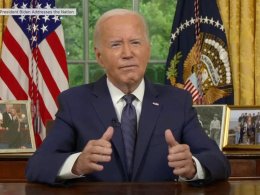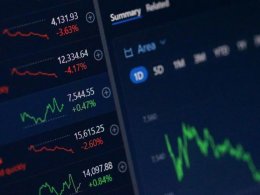The Commerce Department said Thursday that U.S. economic output decreased by almost 1% between April and July, marking the second consecutive quarter of contraction and indicating that a recession might be coming.
The department's second-quarter data for gross domestic product over the three-month period showed a decline of 0.9%, which was in line with most analysts' projections.
Most economists expected the report would show either slight economic growth or slight economic contraction. Goldman Sachs said any growth would be less than 1% and Moody's Analytics expected the report to show a decline of about 1%. Atlanta Fed's GDP Now tracker forecast a 1.2% decline in the second quarter.
"The decrease in real GDP reflected decreases in private inventory investment, residential fixed investment, federal government spending, state and local government spending and nonresidential fixed investment that were partly offset by increases in exports and personal consumption expenditures," the department said in its report. "Imports, which are a subtraction in the calculation of GDP, increased."
Thursday's report showed the second consecutive quarterly decline. Last month, the department said GDP declined by about 1.6% in the January-March period.
Gross domestic product is the total output of goods and services.
The report is the Commerce Department's first estimate. A more complete picture of second-quarter GDP will be issued Aug. 25, the department said.
President joe Biden said that it shouldn't be a surprise that the economy is sluggish right now, given the overall growth over the past year.
"Coming off of last year's historic economic growth -- and regaining all the private sector jobs lost during the pandemic crisis -- it's no surprise that the economy is slowing down as the Federal Reserve acts to bring down inflation," Biden said in a statement.
"But even as we face historic global challenges, we are on the right path and we will come through this transition stronger and more secure."
The president noted that the labor market continues to be strong, with low unemployment and solid job growth.
"Our job market remains historically strong, with unemployment at 3.6% and more than 1 million jobs created in the second quarter alone," he said.
Biden also noted that Congress is working to pass a bill to increase U.S. production of semiconductor chips. A shortage of chips over the past year has contributed to supply chain issues and disrupted production across many industries.
The Senate passed the bill on Wednesday and the House is expected to do so as early as Thursday.
"My economic plan is focused on bringing inflation down, without giving up all the economic gains we have made," Biden said. "Congress has an historic chance to do that by passing the CHIPS and Science Act and Inflation Reduction Act without delay."
Thursday's report came one day after the Federal Reserve ordered another .75% interest rate hike, a dramatic action intended to control hot-running inflation.
Following the decision, Fed Chair Jerome Powell said that -- despite higher inflation -- he doesn't believe the U.S. economy is in a recession.
"The reason is there are too many areas of the economy that are performing too well," Powell added.
The National Bureau of Economic Research, the agency that determines whether the economy is in a recession, also is not expected to declare one.
"Let's say it's negative. The headline everywhere is going to be 'recession.' That's not how the markets think about it, but you'll see people screaming 'recession,'" Michael Schumacher, head of macro strategy at Wells Fargo, said before the report, according to CNBC.
"Then there will be a debate about it. ... It will matter more to the political types than the market."
Experts say there are still positive signs -- such a strong labor market, a solid month for durable goods and data that show the United States is narrowing the global trade gap.
There was also some positive news on Wednesday from the Congressional Budget Office, which said the federal deficit this year is lower than expected. However, it noted in its 30-year outlook that it could soon spike to record highs and threaten economic growth.
The CBO report said the federal deficit was lower due partly to faster economic growth and higher tax revenues in the wake of the COVID-19 pandemic.










